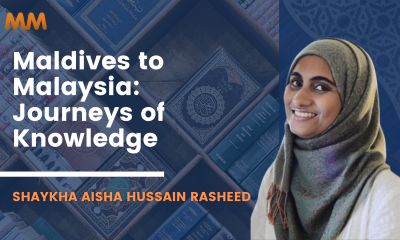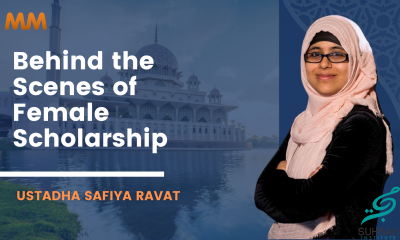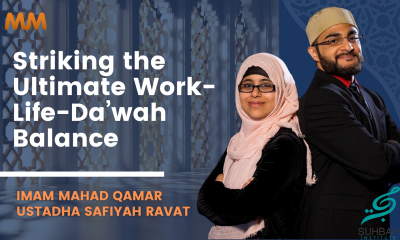The Many Paths to God?
Introduction
As Muslims living in the West, we are faced with a myriad of legal, religious and political problems that our brothers in the East are relatively free from.
Keep supporting MuslimMatters for the sake of Allah
Alhamdulillah, we're at over 850 supporters. Help us get to 900 supporters this month. All it takes is a small gift from a reader like you to keep us going, for just $2 / month.
The Prophet (SAW) has taught us the best of deeds are those that done consistently, even if they are small.
Click here to support MuslimMatters with a monthly donation of $2 per month. Set it and collect blessings from Allah (swt) for the khayr you're supporting without thinking about it.
One of the more controversial issues – an issue that intersects politics and religion – is the Islamic attitude towards ‘the other.’ Many questions are raised, including: what does Islam say about other faiths? What is a Muslim’s obligation vis-à-vis people of other religions? Is it morally and legally acceptable to reject Islam and believe in another system of beliefs? What about the fate of such people in the Hereafter?
It is my intention to elaborate on some of these issues in future articles, in particular the issue of the relationship that Islam posits with people of other religions (or, to be more precise, the issue of al-walā wa al-barāʾ, which I believe has been greatly misunderstood by certain segments of society). In this series of articles, however, I will concentrate on a very crucial theological tenet of Islam: the issue of salvific exclusivity. Salvific exclusivity is the belief that the only way to achieve salvation, and hence Paradise (or the Hindu moksha, or the Buddhist Nirvana, or whatever else one believes in), is through one’s own system of beliefs. This topic is one that seriously deserves attention in our times for a number of reasons.
Firstly, due to allegations by sincere, concerned non-Muslims, and also by Islamophobes, that this belief is a dangerous belief that leads to a religious hatred of others, which in turn leads to extremism and acts of violence. Sadly, it is undeniably true that some elements within Islam have indeed gone to extremes in this regard. Yet, this is obviously not the message that the vast majority of Muslims derive from this belief. Therefore, it is incumbent upon us to prove that the one (i.e., belief in exclusive salvation) does not and should not lead to the other (i.e., violence and terrorism).
Secondly, in the politically correct climate of the era that we find ourselves in, it is getting more and more difficult for any religion to publicly make such claims. The claim that one’s own faith is correct, and all other faiths are incorrect, is deemed by many (especially but not exclusively by those who do not view themselves as being particularly religious) as arrogant and self-aggrandizing. Hence, it needs to be shown that what is intended by this belief is not self-piety or appropriation of Heaven to oneself, but rather the theological perfection of Islamic beliefs and its claims of universality and finality. Only because Islam views itself as being perfect can it claim to be God’s revelation for all of mankind.
Thirdly, due to the preceding two factors, for the first time in our religious and intellectual history, there is a concerted effort by some elements who presume themselves to be authorities, in particular those who label themselves as ‘progressives’, to try to reinterpret this foundational bedrock of the religion. To this end, they claim that Islam is not the only morally acceptable path sanctioned by God. Typically, such claims center around the premise that the ‘People of the Book’ are at par with Muslims in a triad of the ‘Abrahamic faiths’. “All of us worship the same God, are children of the same father, revere the same prophets, and eventually arrive at the same goal,” you hear one of them say, “even though our paths might be different.” In even more extreme examples, some have embraced pure Perennialist beliefs, and claim that all paths, even paganism and idolatry, are manifestations of Divine Truth and eventually lead to God.
Hence, in light of the above points, it is crucial that an article be written that elaborates on this point in an unapologetic and frank manner while at the same time explaining the legitimate concerns that sincere people, of all faiths, have. Such an article needs to refute both the militant extremists who have misunderstood this point to justify their acts of terror, and the progressive liberals who have, unwittingly, destroyed central theological beliefs upon which the very foundation of Islam is built. It is my sincere hope that this article helps in achieving this goal.
The article will comprise of this introduction and four parts. In part one, the Islamic beliefs regarding salvific exclusivity will be mentioned. It will proven, from Islamic sources, that it is a fundamental principle of Islam that the only morally acceptable and divinely sanctioned religion is that of Islam. To deny this is tantamount to rejecting Islam. This part will also briefly touch on the fact that this belief is a moral and religious judgment, and not a politically enforceable one, even in an Islamic state.
In part two, the arguments that are used by certain progressives to claim that other religions are also morally acceptable will be challenged and explained. In particular, verse 2:62, “Verily, those who believe, and the Jews, and Christians, and Sabeans, whoever believes in God and does good, shall have no cause to fear, nor shall they grieve,” which is the crux of their argument, will be understood properly.
In part three, the beliefs of various other faiths regarding salvific exclusivity will be discussed. The purpose here will be to show that it is a mainstream theological tenet of most religions that only their particular religion leads to salvation. Hence, Muslims are no different in this regard from the majority of other world faiths.
Lastly, in part four, we will touch upon some political ramifications of this belief, specifically in the context of Western liberal secular democracies. Should politicians in our lands be concerned with this issue? Are such beliefs necessarily or even potentially harmful for a healthy, multi-cultural and multi-religious society? And if so, should sincere politicians (wa qalīlun māhum) intervene?
At the outset, let me make it clear that the first part of this series does not merely claim to represent the author’s opinion, but rather the Islamic opinion, concerning which no organized sect within the religion (Sunni, Shiite, Mu`tazilite, Kharijite, etc.) has ever differed regarding. The last two parts, however, represent the opinion of the author. It goes without saying that this article does not aim to be comprehensive in its scope, and there are many tangents that have either been glossed over or not mentioned at all.













Joyhamza
January 22, 2008 at 11:03 AM
can’t wait to read ’em all!! :D :D
Hidayah
January 22, 2008 at 11:25 AM
Asslamu Alikum WR WB, Cant wait to read them alllllllllllll…issue is extremely important to me as a professional women and dealing with non-Muslims 24/7 =)
AnonyMouse
January 22, 2008 at 4:33 PM
JazakAllahu alf khair in advance! SubhanAllah, we reeeeeeeeeeaaaaaaaaaaaaalllllllllyyyyyyyyyy need something like this… it has the potential to rock the Islamosphere! :D
Bhaskar Dasgupta
January 22, 2008 at 5:29 PM
Good article, but perhaps would be stating the obvious. The three abrahamic religions do state so that they are the only way to God.
But what I would have liked to hear was who actually was the progressive or liberal Muslim who said “sarva dharma sambhav” (all faith’s are possible) You do refer to them in general, but can you kindly point to people and references who have have actually and publicly said so? It would have helped your article if we could have also referred to similarly well argued points.
look forward to the next bit! :)
Dawud Israel
January 23, 2008 at 12:00 AM
Mixed feelings about this one…either way should be interesting.
Small request shaykh, can you include a discussion regarding the Perennialist Muslims (schuon, rene guenon etc.) …from my understanding some of them were in the fold of Islam while others went too far, but their powerful Dawah in the West created some amazing literary works, in my opinion the best Islamic literature in the English language, that still bring many into Islam.
Yus from the Nati
January 23, 2008 at 12:58 AM
“With regards to the meat issue, insha Allah it is my intention to write a long article or series of articles on this topic. It is amazing that (as far as I know) no one has really produced an academic work on this topic despite its importance.”
I’m still waiting for this article! Where you at akhi! I’m on the verge of becoming a vegetarian! just messing. I know other things are more important. Do that there.
Pingback: muslimmatters.org » Salvific Exclusivity: Part One
Sis Shaykha
February 4, 2008 at 6:27 PM
Asalaamu Alaaikum
Insha’Allah, sounds good Sheikh!
Looking forward to reading the series….
Pingback: Salvific Exclusivity « Islam|HD
AsimG
December 13, 2009 at 12:17 AM
Shaykh Yasir,
any plans to finish to post the other 3 insha’Allah?
Ahmed B
December 13, 2009 at 12:52 AM
Here’s part one…really hope the Sheikh finishes the series someday! This topic often comes up from Muslims conducting interfaith work.
Pingback: Path of Allah or the Paths of Allah? Survey of Classical and Medieval Interpretations of Salvific Exclusivity | Yasir Qadhi Video | MuslimMatters.org